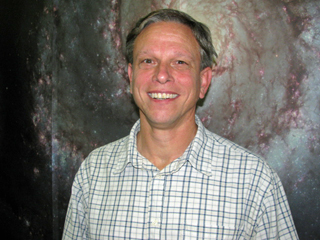Department of Physics and Astronomy

"I didn't give up," says Dr. Jon Hakkila, revealing an attitude that has contributed to a successful career both inside and outside of the College of Charleston.
Hakkila joined the College of Charleston faculty family as chair of the physics and astronomy department in 1999. To date, he has written four books, attracted more than $1 million in research grants, and has molded the minds of a countless numbers of students.
"There is a lot to love about the College of Charleston," says Hakkila, "the faculty, the students, and I especially love the overall philosophy of the school."
"Dr. Hakkila was like my morning coffee," says former student Katy Poole. "His passion in class really got me going every day."
"Yeah, I really enjoyed his class," adds senior Grant Culter.
Hakkila's enthusiasm for his field is evident on his office walls, covered with astronomy charts, graphs, and pictures of past conferences. His passion could make even the most uninterested students want to learn more about his subject.
A key focus of Hakkila's research pertains to gamma-ray bursts, the most violent explosions in the universe. His current research focuses on analyzing the pulses of these bursts. He says he has found important information that has been overlooked for many years.
"I am one of the few still analyzing and finding what others glossed over," Hakkila explains. "The old stuff is still there."
Hakkila says this "old stuff" is still there because modern data mining and informatics tools allow modern scientists to find gems in previously unmined data.
Research funding, as Hakkila and researchers can atest, is not easy to attain. Two years ago, Hakkila submitted four federal grant proposals, each requiring a tremendous amount of work, and was funded on none.
But giving up was not an option for someone with such passion. Instead, Hakkila submitted another six proposals last year and was funded for three of them, NASA grants totalling more than $1 million. Additionally, one of the proposals that was not funded was selected as one of two South Carolina entries in a national NASA competition.
Hakkila isalso proud that every physics and astronomy major at the College of Charleston who wanted to do research with a departmental faculty member was given funding this past summer. His cites this achievement as one that contributes to the ability of the faculty to acquire external funds as well as having exciting research projects that students want to be a part of.
Although Hakkila enjoys talking about his research and findings, he takes every opportunity to praise the entire department as a whole and is proud of all of his faculty members.
Originally from New Mexico, Hakkila received his bachelor's degree in physics at the University of California in San Diego. He would return to New Mexico State to earn a master's degree and doctorate, each in astronomy.
Hakkila is certainly one of College of Charleston's finest and a true testament to what the school has to offer. His never give up philosophy should be inspirational to us all.
###